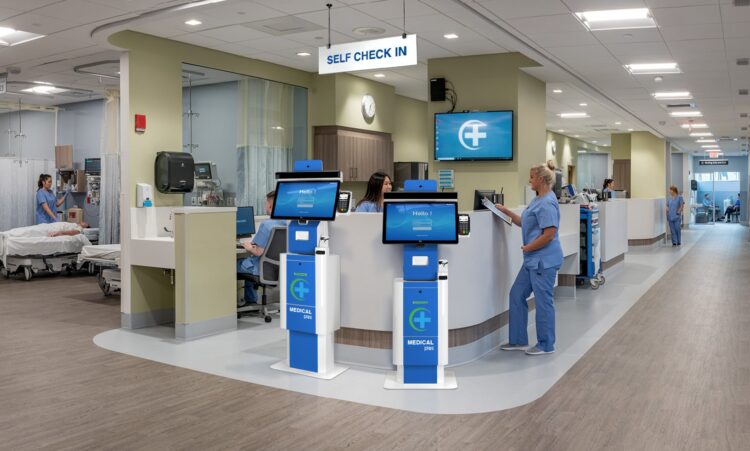Self-service kiosks in healthcare are touch-screen terminals that empower patients to check in, update personal information, and pay for services without direct interaction with staff. Such kiosks are popping up in hospitals and clinics worldwide, promising to revolutionize how patients engage with health services. Unlike traditional check-in processes that can be cumbersome and time-consuming, kiosks offer a seamless experience that aligns better with the fast-paced lifestyles of modern patients.
As healthcare evolves, integrating technology into the patient experience becomes increasingly significant. One pivotal development in this transformation is the implementation of self-service solutions, such as a patient check-in kiosk. Check-in kiosks in healthcare facilities improve efficiency and patient satisfaction by streamlining the check-in process, reducing waiting time and administrative burdens. They also allow healthcare providers to reallocate resources effectively, enhancing service quality and reducing administrative burdens.
While these systems are relatively new to many clinics and hospitals, their adoption is rapidly growing due to their ability to provide a more patient-centric approach. In today’s fast-paced world, the demand for convenient and swift healthcare interactions has never been more crucial, prompting the healthcare industry to embrace innovative solutions like kiosks to meet these needs effectively. The kiosks improve data accuracy by enabling patient self-verification and reducing errors due to staff manually entering data.
The Rise of Patient-Centric Solutions
The healthcare sector is transforming towards patient-centric solutions, with technology playing a crucial role in enhancing patient experience, mainly by introducing self-service check-in kiosks. These kiosks reduce wait times by allowing patients to check in quickly, update personal information, and complete forms without assistance. This not only improves efficiency but also minimizes paperwork and human errors.
Patient privacy is another benefit, as kiosks allow individuals to enter sensitive information discreetly. Many kiosks also support multiple languages, making healthcare more accessible to diverse communities. Additionally, integrated payment processing simplifies billing, reducing front desk congestion. As healthcare providers focus on improving convenience and accessibility, self-service check-in kiosks are essential to patient care. By leveraging technology, medical facilities can create a more efficient, secure, and patient-friendly environment while optimizing staff resources.
Technological Advancements in Healthcare Kiosks
Technological advancements have enhanced healthcare kiosks, offering intuitive interfaces for patients to easily navigate their information, select appointments, and understand health insurance details. Kiosks in healthcare promote diversity, reduce language barriers, and enhance administrative efficiency by automating repetitive tasks, allowing healthcare workers to focus on personalized patient care. This leads to a more organized workflow, enhancing operational efficiency and patient record accuracy. These advancements have improved patient experience and administrative efficiency in healthcare facilities.
Benefits of Patient Check-In Kiosks
Patient check-in kiosks are altering healthcare facilities by increasing efficiency, lowering wait times, and improving the patient experience. These self-service kiosks enable patients to check in, update personal information, and complete required documents without waiting in large queues. By automating these tasks, clinics and hospitals can reduce administrative burdens on staff, allowing them to focus on providing quality care.
One significant benefit is increased accuracy in patient data collection. Since patients enter their information, the risk of errors caused by miscommunication or handwriting issues is minimized. Kiosks also streamline payment processing, allowing patients to handle copays and billing electronically, reducing paperwork, and improving financial workflows.
Additionally, patient privacy is enhanced, as individuals can input their details discreetly rather than discussing sensitive information at the front desk. Many kiosks also offer multilingual support, making the check-in process more accessible for diverse patient populations.
Patients can easily confirm, reschedule, or cancel visits with integrated appointment scheduling. As healthcare facilities continue embracing digital solutions, patient check-in kiosks are crucial in optimizing operations, improving patient satisfaction, and ensuring a more seamless and secure healthcare experience for patients and providers.
Challenges and Considerations
The increasing adoption of kiosks in healthcare requires robust systems to protect patient information from breaches or misuse. Encryption, regular software updates, and secure network protocols are essential for safe kiosk deployment. Designing kiosks to be inclusive is crucial for all patients, regardless of ability. Including features for visually or hearing impaired patients, such as adjustable screens, voice outputs, and Braille keypads, can provide equitable access to healthcare services, demonstrating the industry’s commitment to inclusivity.
Future of Self-Service Kiosks
Artificial intelligence, automation, and personalization advancements shape the future of self-service kiosks. These kiosks are expected to offer faster, more seamless experiences, anticipate guest needs, suggest personalized services, and handle complex requests with minimal human intervention. Security measures such as face recognition and biometric verification will improve ease, while mobile device integration will enable visitors to conduct purchases using their phones. Voice-activated technology and multilingual support will make kiosks more accessible to diverse users. Sustainability will be a key factor, with energy-efficient designs and digital receipts reducing environmental impact.
Conclusion: Embracing Innovation for Better Patient Care
As technology continues to drive change in healthcare, patient check-in kiosks are essential for more efficient, patient-centered care models. By embracing these innovations, healthcare facilities can enhance patient satisfaction, reduce staff workloads, and ultimately offer better care. Investment in kiosk technology is not just in hardware but in the future of patients’ healthcare experiences, promising a horizon where technology and human care work hand in hand to deliver exceptional outcomes.














